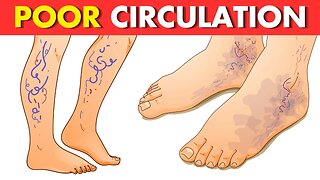Premium Only Content

7 Reasons You Need To Eat More Eggs
You may have heard the saying that too much of anything isn’t a good thing. This used to be the case for eggs, who received a bad reputation a few years back for being unhealthy and for containing a large amount of cholesterol.
It is true that an average egg contains anywhere between 180 to 186mg of cholesterol. Now, some may not know this, but your body produces cholesterol on its own: somewhere between 1,000mg to 2,000mg each day. Your body adjusts itself when you eat foods that contain cholesterol. Therefore, eggs do not increase the amount of cholesterol in your body.
In today’s video we will discuss the benefits of eating eggs.
1. Cholesterol
Let’s begin right with the cholesterol, since that is the greatest argument that people have against eggs. Yet, eggs have high-density lipoproteins that are essential to your brain and your body. They keep every cell in your body stable and help you to produce vitamin D and hormones.
Eggs keep your good cholesterol high and your bad cholesterol low. While eggs have been shown to increase the chance of developing a cardiovascular disease in diabetics, they are relatively healthy to consume.
A better way to control your cholesterol levels is to eat a healthy diet and live a healthy lifestyle.
2. Nutrients
Eggs contain a vast amount of nutrients. Specifically, they contain Vitamin A, Vitamin E, Vitamin B6, Vitamin B12, Thiamin, Riboflavin folate, Iron, Phosphorous, Magnesium, and Selenium. Eggs really do give you a nutrient packed kick, showing why you should consume them on a regular basis.
3. Benefits Eyes
Eggs have nutrients that are beneficial to your vision health, such as lutein and zeaxanthin. These nutrients can reduce the chances of getting age-related macular degeneration, which can lead you to becoming blind in your older age. Another nutrient, carotenoids, increase your ability to see in the night, decreases your chance of developing cataracts by at least 50%. They also protect your eyes from the harmful damage of the sun.
4. Choline
Eggs also contain an important nutrient that is called choline, which helps in the proper function of your brain, development of your brain and the function of your memory. It is often recommended by doctors that pregnant women take choline supplements to avoid any developmental troubles to their newborn baby.
Something like 90% of American citizens do not get enough choline, which makes them prone to muscle damage and non-alcoholic fatty liver disease.
5. Helps Bones
Not surprisingly, eggs also are packed with nutrients that help to maintain and build strong bones while maintaining proper density of the bones. Eggs contain Calcium and Vitamin D. Vitamin D is necessary to help the body absorb Calcium. Meanwhile, Calcium is important for your body to be able to clot blood, signal your nervous system and contract your muscles.
6. Builds Muscles
Did you know that two eggs have as much protein in them as just one serving of meat, without any of the fat and acid that comes along with it. Sometimes, you will see that many diets call for just eating egg whites; however, half of the protein in the egg is contained in the yolk. Eating more eggs will help you bulk up in no time.
7. Weight-loss
Eggs are full of nutrients and protein, so they are more filling and satiable. Yet, they are low in the amount of calories that they contain. Eating eggs during breakfast will fill your stomach and make it so that you stay fuller, longer, per The Journal of the American College of Nutrition and The International Journal of Obesity. Eggs can help with weight-loss, your waist size and reducing your body fat index.
So, eggs aren’t bad for you after all. In fact, they are very beneficial to you. Do you eat eggs on a daily basis? Have you reaped their health benefits? Let us know in the comment section.
Facebook: https://bit.ly/38BWbw3
Pinterest: https://bit.ly/2Irvwa6
Disclaimer: The materials and the information contained on Natural Cures channel are provided for general and educational purposes only and do not constitute any legal, medical or other professional advice on any subject matter. These statements have not been evaluated by the FDA and are not intended to diagnose, treat or cure any disease. Always seek the advice of your physician or other qualified health provider prior to starting any new diet or treatment and with any questions you may have regarding a medical condition. If you have or suspect that you have a medical problem, promptly contact your health care provider.
-
 4:50
4:50
Natural Cures
1 year ago $1.11 earned5 Warning Signs of Poor Circulation and How to Fix It
3.13K1 -
 LIVE
LIVE
Nerdrotic
3 hours ago $4.91 earnedCap 4 and Emelia Perez BACKLASH! Acolyte is Still CANCELED! Hollywood STFU | Friday Night Tights 339
6,085 watching -
 LIVE
LIVE
The Jimmy Dore Show
2 hours agoTulsi SHREDS Intel Agencies in Senate Hearing! Jon Stewart’s Anti-China Propaganda! w/Elaine Culotti
18,801 watching -
 23:15
23:15
Bare Knuckle Fighting Championship
1 day agoBKFC FIGHT NIGHT MOHEGAN SUN FREE FIGHTS
1.21K -
 5:49:46
5:49:46
Bitfinex
6 hours agoBitfinex Talks Live at PlanB El Salvador - Day 2
4.54K1 -
 41:47
41:47
Candace Show Podcast
3 hours agoBecoming Brigitte: An Introduction
74.6K91 -
 1:27:41
1:27:41
vivafrei
4 hours agoBernie Gets DESTROYED! Confirmation Hearings RECAP! D.C. Aviation Disaster & MORE!
69.9K57 -
 13:16
13:16
ariellescarcella
3 hours agoThese TikTok 'Trans Women' Converting To Islam Are A Problem...
2.31K6 -
![Special guest: Sam Anthony, CEO & Founder, [your] News](https://1a-1791.com/video/fwe2/e2/s8/1/B/m/X/b/BmXbx.0kob-small-Special-guest-Sam-Anthony-C.jpg) 55:09
55:09
Purham & Associates Show
4 days agoSpecial guest: Sam Anthony, CEO & Founder, [your] News
1.99K -
 1:34:42
1:34:42
The Quartering
5 hours agoNew Crash Footage PROVES Whose At Fault, Air Traffic Control Exposed, RFK Blasted, AI Issues
134K41